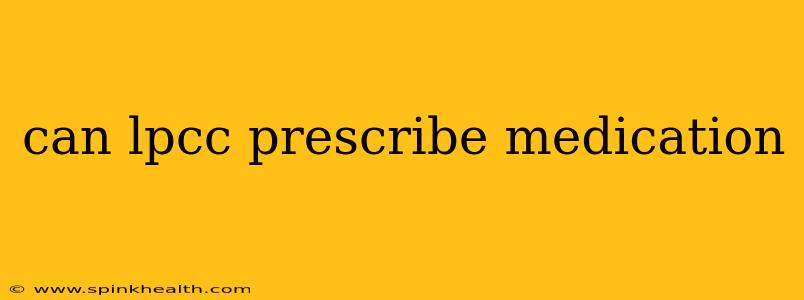Can LPCs Prescribe Medication? Navigating the Landscape of Mental Healthcare
The question of whether Licensed Professional Counselors (LPCs) can prescribe medication is a complex one, and the answer isn't a simple yes or no. It depends entirely on the state in which they practice and the specific regulations in place. Imagine a patchwork quilt – each state has its own unique rules governing the scope of practice for mental health professionals. Let's unravel this intricate tapestry together.
In many states, the answer is a resounding no. LPCs are trained in counseling techniques, psychotherapy, and building therapeutic relationships. Their expertise lies in helping individuals understand and manage their mental and emotional well-being through talk therapy and other non-pharmacological approaches. Prescribing medication requires a different level of training and licensing, typically reserved for medical professionals like psychiatrists and, in some states, psychiatric nurse practitioners.
However, the landscape is shifting. Some states are exploring and implementing collaborative practice agreements or similar models that allow LPCs to work alongside physicians to provide medication management under specific conditions. This is often referred to as "prescriptive authority" or the ability to prescribe medications. This doesn't mean the LPC is independently prescribing; it's a collaborative effort under the supervision of a physician.
What are Collaborative Practice Agreements?
H2: What are Collaborative Practice Agreements?
Collaborative Practice Agreements (CPAs) are formal agreements between physicians (usually psychiatrists) and LPCs or other qualified mental health professionals. These agreements outline the specific parameters under which the LPC can participate in medication management for patients. This often involves the physician initially evaluating the patient, determining the appropriate medication, and setting protocols for the LPC to monitor the patient's progress, adjust dosages (within established parameters), and consult with the physician as needed. The physician maintains overall responsibility for the medication management plan.
Can LPCs prescribe medication independently?
H2: Can LPCs prescribe medication independently?
In the vast majority of states, the answer is no. Independent prescription privileges for LPCs are rare. While the movement towards collaborative practice agreements is gaining momentum, the independent prescription of medication by LPCs remains largely outside their current scope of practice in most jurisdictions.
What other mental health professionals can prescribe medication?
H2: What other mental health professionals can prescribe medication?
Psychiatrists are the primary medical professionals who can prescribe medication for mental health conditions. In some states, psychiatric nurse practitioners (PMHNPs) and physician assistants (PAs) with specialized training may also have prescriptive authority. The specific regulations regarding the prescribing privileges of these professionals vary by state as well.
How can I find out if LPCs in my state can prescribe medication?
H2: How can I find out if LPCs in my state can prescribe medication?
The best way to determine whether LPCs in your state can prescribe medication, even under collaborative practice agreements, is to check your state's licensing board for professional counselors or the state's board of medicine. Their websites often provide detailed information about the scope of practice for various healthcare professionals. You can also consult with a healthcare provider or lawyer specializing in healthcare regulations.
The Bottom Line:
While some states are moving towards models that allow for collaboration on medication management between LPCs and physicians, it's crucial to remember that this is not universally applicable. The ability of an LPC to prescribe medication is highly dependent on their state's regulations. Always check with your state's licensing board for accurate and up-to-date information. If you're seeking medication for a mental health condition, it's best to consult with a psychiatrist or other appropriately licensed medical professional.

